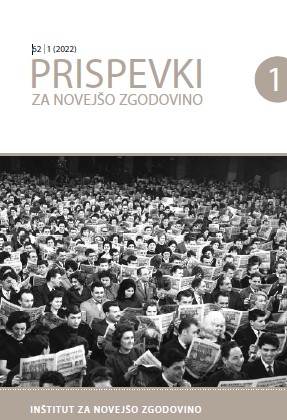The Journalist’s Action in Socialist Yugoslavia: Understanding the Formulation “Journalist as a Sociopolitical Worker”
The Journalist’s Action in Socialist Yugoslavia: Understanding the Formulation “Journalist as a Sociopolitical Worker”
Author(s): Nina ŽnidaršičSubject(s): Media studies, Government/Political systems, Politics and communication, Post-War period (1950 - 1989)
Published by: Inštitut za novejšo zgodovino
Keywords: journalist; socio-political worker; socialism; self-management; Yugoslavia;
Summary/Abstract: In this paper, we analyse the language game “the journalist as a socio-political worker”, which was the professional label for journalists’ action in the former socialist Yugoslavia. The text is divided into two main parts. The first part uses a historical-conceptual method to analyse the mentioned formulation in normative texts, covering programmatic and engaged texts produced at the time. This approach seeks to enter into the meaning of the term from the inside, into the pulse and spirit of the time, and above all to understand what its creators wished to achieve and communicate with this expression. We find that journalism and the journalist’s action as a socio-political worker were understood as an important political factor, as a political force on one hand contributing to the development and implementation of a new socio-political order, i.e., a socialist community based on self-management and, on the other hand, the journalist who through their own products tried to influence the broader consciousness of the masses, as manifested through the idea of the education for the new man: the self-manager. The second part of the paper complements the first since through the qualitative method of in-depth semi-structured interviews with former journalists who had been professionally active in the Socialist Federal Republic of Yugoslavia, and via their recollections, we continue to internally reconstruct the meaning, understanding and use of the formulation at that time. In particular, we observe the relationship with politics that the concept essentially contains. Empirical analysis thus led us to different conclusions: some interviewees (the minority) described the term affirmatively, that the journalist as a sociopolitical worker had a special mission, while most approached the use and meaning of the expression with a critical distance, namely, that the journalist as a socio-political worker was harnessed to the needs of daily politics and thereby seen as non-autonomous in their labour and actions.
Journal: Prispevki za novejšo zgodovino (before 1960: Prispevki za zgodovino delavskega gibanja)
- Issue Year: 62/2022
- Issue No: 1
- Page Range: 82-102
- Page Count: 21
- Language: English

